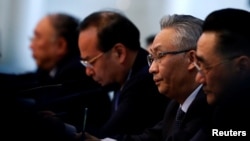Avoiding controversial questions and sticking closely to the script, three leading candidates jostling for a spot on the Communist Party's apex of power made rare public appearances on the sidelines of China's annual meeting of parliament on Monday.
China is gearing up for a tricky leadership transition in the autumn, when President Xi Jinping will seek to cement his power and get many of his supporters on to the Politburo Standing Committee, a group currently of seven men who have ultimate power making decisions in the world's second-largest economy.
Much of the horse-trading for who will get in, and who will miss out, happens behind closed doors, with generally speaking none of the overt campaigning that happens in places like neighboring Taiwan, the proudly democratic self-ruled island China claims as its own.
Guangdong provincial party secretary Hu Chunhua, Chongqing boss Sun Zhengcai and Guizhou's Chen Miner, all born in the 1960s, are considered prime contenders out of the so-called sixth-generation leadership candidates to be promoted into the Standing Committee at the five-yearly party congress.
But with disagreements and competition amongst China's ruling elite normally happening out of sight, and indeed with public argument frowned upon, Hu, Sun and Chen gave little away.
Of the three, Chen, who is close to Xi having worked with him in Zhejiang province, is considered the outside shot candidate for promotion by sources with ties to the leadership and diplomats.
After fielding pre-arranged questions from Chinese state media, Chen declined to answer a question from a Hong Kong reporter, cutting him off mid-sentence once he realized he was not from a mainland media outlet.
"I think in future (years) we can let the press conference run later but factoring in the time on the road here and back, time is very precious," Chen said. "We'll end the press conference here."
Sun, meanwhile, answered three questions from Chinese media focusing largely on economic matters, including one on progress on one of Xi's key economic strategies, the Yangtze Economic Belt.
"Chongqing plays a special and important role in developing the area and in opening up to outside China," Sun said.
No foreign journalists were given the opportunity to ask questions at the Chongqing delegation meeting.
The Chongqing delegation is a particularly sensitive one due to the graft scandal that enveloped the charismatic former party boss Bo Xilai, jailed for life in 2013.
The party's anti-corruption watchdog last month criticized Chongqing for failing to "sufficiently dispel the poison" of Bo.
It was much the same at the Guangdong delegation, where Hu did not even speak until he was asked the first and only question allowed to him from media present.
"Overall, Guangdong has passed the phase where part of the districts became more well off first," he said. "Ultimately we will reach the goal of becoming wealthy altogether. As such, the next task is to solve and coordinate issues, development issues."





